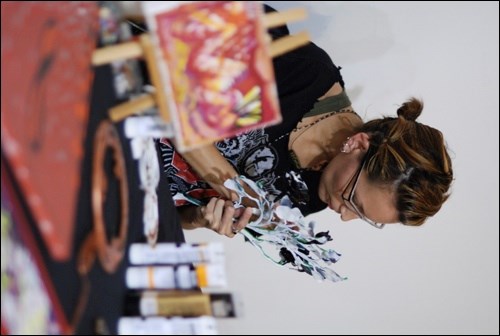Christine Wahobin has had her share of ups and downs, of blues and sunshine.
In a moving speech during a an early June First Nations women's health gala , Wahobin, who took part in the research project, told the captive audience about her life and her experience with alcoholism. She said the death of her father, an alcoholic, forced her to examine her life and she made the decision to quit drinking.
"I'm so happy I'm sober, because people look at me differently now," she said, "they look at me with respect."
Wahobin told the audience gathered at the North Battleford Western Development Museum that although she isn't able to undo some mistakes she's made, knowing her experiences might serve as a lesson to others makes the consequences easier to bear. She wants her life to be a message of hope.
"These youngsters need to know that there's hope out there, but you have to try for it," she said.
Wahobin was one of three guest speakers at the event, marking the culmination of a three-year research project on understanding perceptions of healthy body weight and body image held among First Nations women. All were study participants. Although the research project was examining healthy body weight and image, the project's goal was to understand the issue from the cultural viewpoint of First Nations women. As a result, many themes became apparent throughout the process, and for many it became an emotional journey.
Sonya Whitecalf participated in the pilot research project, conducted interviews in the full study and co-ordinated the gala. She said participating in the study has given her a new outlook on what it means to be happy or successful.
"I've really changed the way I think, and I'm feeling better about myself I'm accepting myself more and more," she said.
Whitecalf described the research process, saying many women who were interviewed didn't realize the resiliency they demonstrated. As women, Whitecalf said, they are often the rock at the foundation of the family - they bear and raise children, they cook and clean, and often put themselves and their health on the back burner. Also, being First Nation, they often face unique barriers and challenges. Experiences in residential schools, higher rates of addictions and alcoholism and confronting stereotypes, for example. All of these things, said Whitecalf, have an impact on overall health.
"Our weight is just a symptom," she said. "Weight is just one aspect of health, that's just the tip of the iceberg.
"There's reasons why we're overweight and there's reasons why we have high blood pressure, and there's reasons why we develop diabetes."
Whitecalf said she hopes the project will create awareness and change, and she wants to see every woman go through this process, and challenge their stereotypes.
"There's a big stigma out there, if someone dresses a certain way, or talks a certain way, some people say, 'Oh look at her, she's acting too good, she thinks she's better than us.' That's a barrier. We need to be proud of one another instead of jealous," said Whitecalf.
"It's okay to be proud, it's okay to feel good about yourself."
Whitecalf also arranged to have local First Nation female entrepreneurs at the gala, to act as examples to the young people present.
One of the entrepreneurs was local artist Dana Standinghorn, who said the gala was a positive event for their community. She also had some advice to impart to young women.
"Just go for it," she said, "Don't listen to what anybody says, just go for it."
Even Jennifer Poudrier, who conducted the research project, conceded the theme emerging from the project was much larger and more complex than body image or healthy weight, saying messages of strength and hope were apparent throughout the process, and health, it seems, is more about strength in community.
Poudrier said, "The main thing I've come out of this learning is that there's a lot of exceptionally strong and healthy First Nation women that we don't hear enough of, and that we all can learn a lot from."




